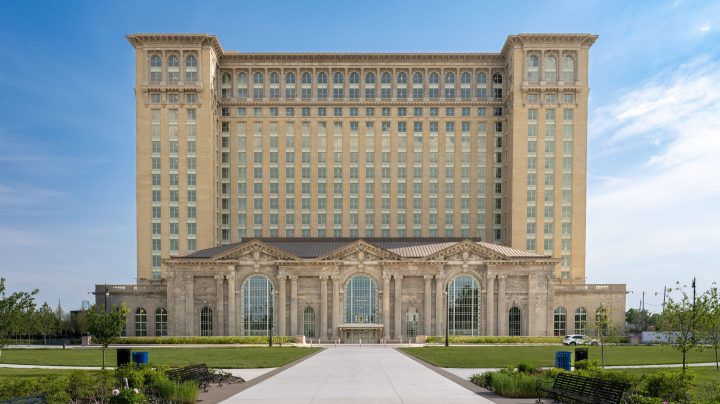
Ford renews a Detroit train depot in hopes of anchoring a new tech hub
Ford renews a Detroit train depot in hopes of anchoring a new tech hub

Outside of the towering Michigan Central Station, landscapers are putting the finishing touches on a lush green campus, adding rows of trees.
“I’ve been told by the architects that Ford wanted something that looked like it had been here,” said foreman Drew Buell. “So, it didn’t look like a new landscape — that’s why everything is kind of a bigger scale and planted close.”
A bigger scale — that’s a theme for this station, restored to its original 1910s Beaux-Arts architectural grandeur. The building draped in limestone, adorned with marble floors, terrazzo walls, grand columns and arches, and detailed carvings.
This is Detroit’s long-abandoned train station, which has been brought back to life by the Ford Motor Company as a new center for tech innovation. Its rebirth will be complete this Thursday with an official reopening party for the public.

“This space was the men’s waiting room,” said Josh Sirefman, who is giving us a tour. He’s CEO of a Ford subsidiary called Michigan Central. It will operate the station, turning it into what’s hoped to be a high-tech mobility hub.
“This space here in the Grand Hall has to be one of the most glorious spaces literally anywhere in the country,” he said.
Glorious now, but from the 1980s until five years ago, the train station sat empty and deteriorating. Ford’s subsidiary reportedly spent nearly $1 billion renovating it, hoping its history, beauty and proximity to Detroit’s big three automakers would entice high-tech startups to locate here.
“The point of innovating, the point of breaking new ground, advancing new ideas never disappeared. And I think the point of all this being where you are now at, Michigan Central, is to create a world-leading centerpoint of that,” said Sirefman.
Directly across from the renovated train station, there’s a proof of concept: Detroit’s old book depository building, which was also abandoned for decades, has also been restored. It reopened last year and houses an incubator of about 100 high-tech mobility start-ups, such as ESSPI.
“I’m a former Detroit firefighter, as well as a public school teacher,” said CEO Ron Butler.
Butler sits in an office surrounded by gadgets, tools and prototypes. “It’s intelligent, thinking blankets.”
He is showing a prototype blanket, woven with glass fibers, that can cover electric vehicles and detect failing batteries before they burst into flames.
“There’s no place like this. Anything we want to do — we build our own electronics boards here and test them, that specialty fire blanket was sewn downstairs,” Butler said.
That kind of synergy is crucial for so-called hard-tech firms, which are focused on building physical things.
“Our margins are always very slim. We’re poor people basically trying to build things. And this place allows us to do that,” said Butler.
That’s the big sell.
There’s more work to do; the campus is surrounded by a neighborhood still struggling to recover from decades of decline. The hope is that Michigan Central can be the anchor of a tech renaissance.
There’s a lot happening in the world. Through it all, Marketplace is here for you.
You rely on Marketplace to break down the world’s events and tell you how it affects you in a fact-based, approachable way. We rely on your financial support to keep making that possible.
Your donation today powers the independent journalism that you rely on. For just $5/month, you can help sustain Marketplace so we can keep reporting on the things that matter to you.











